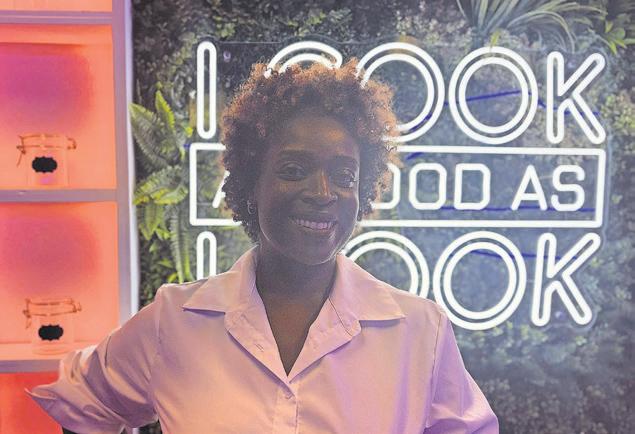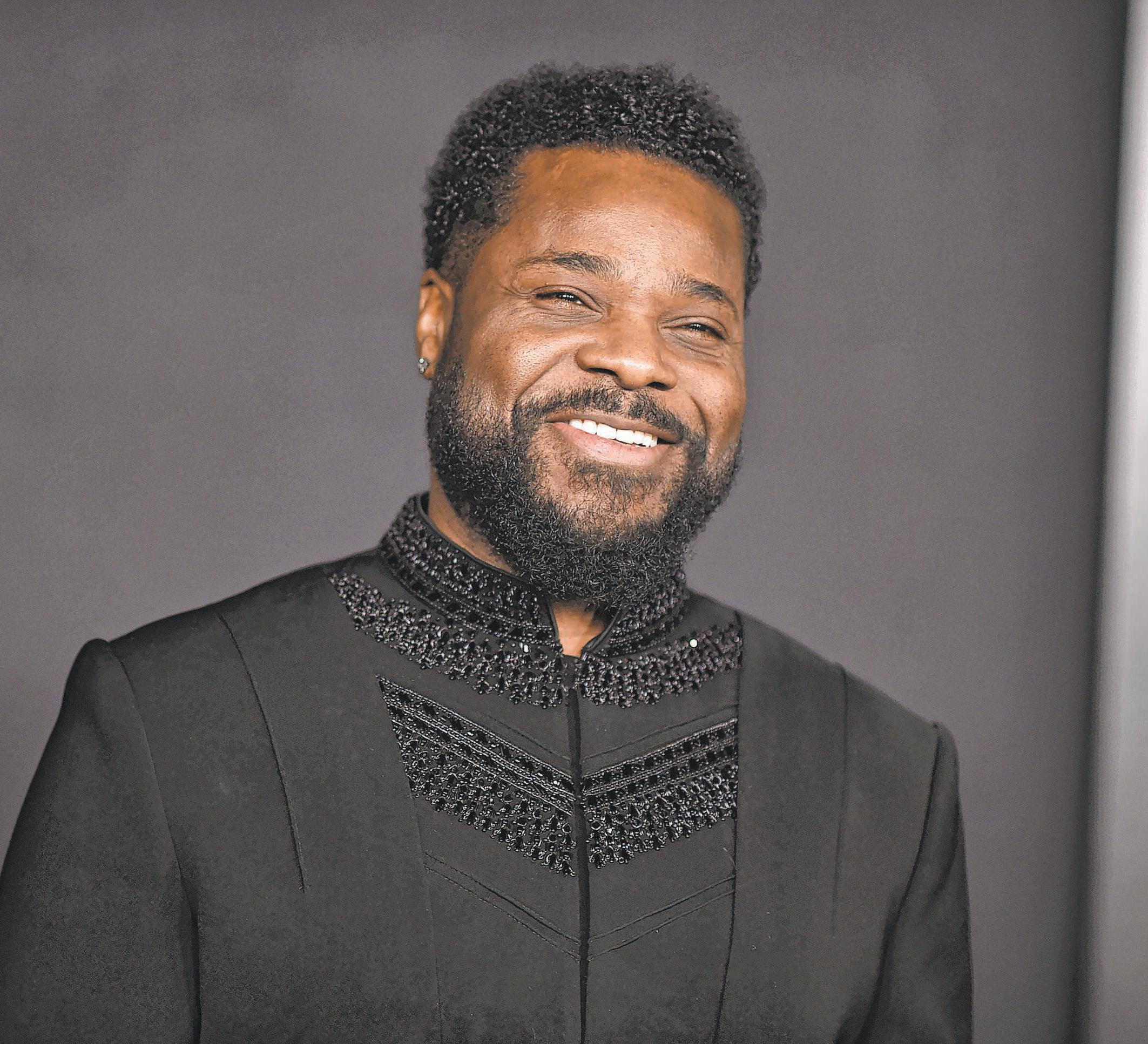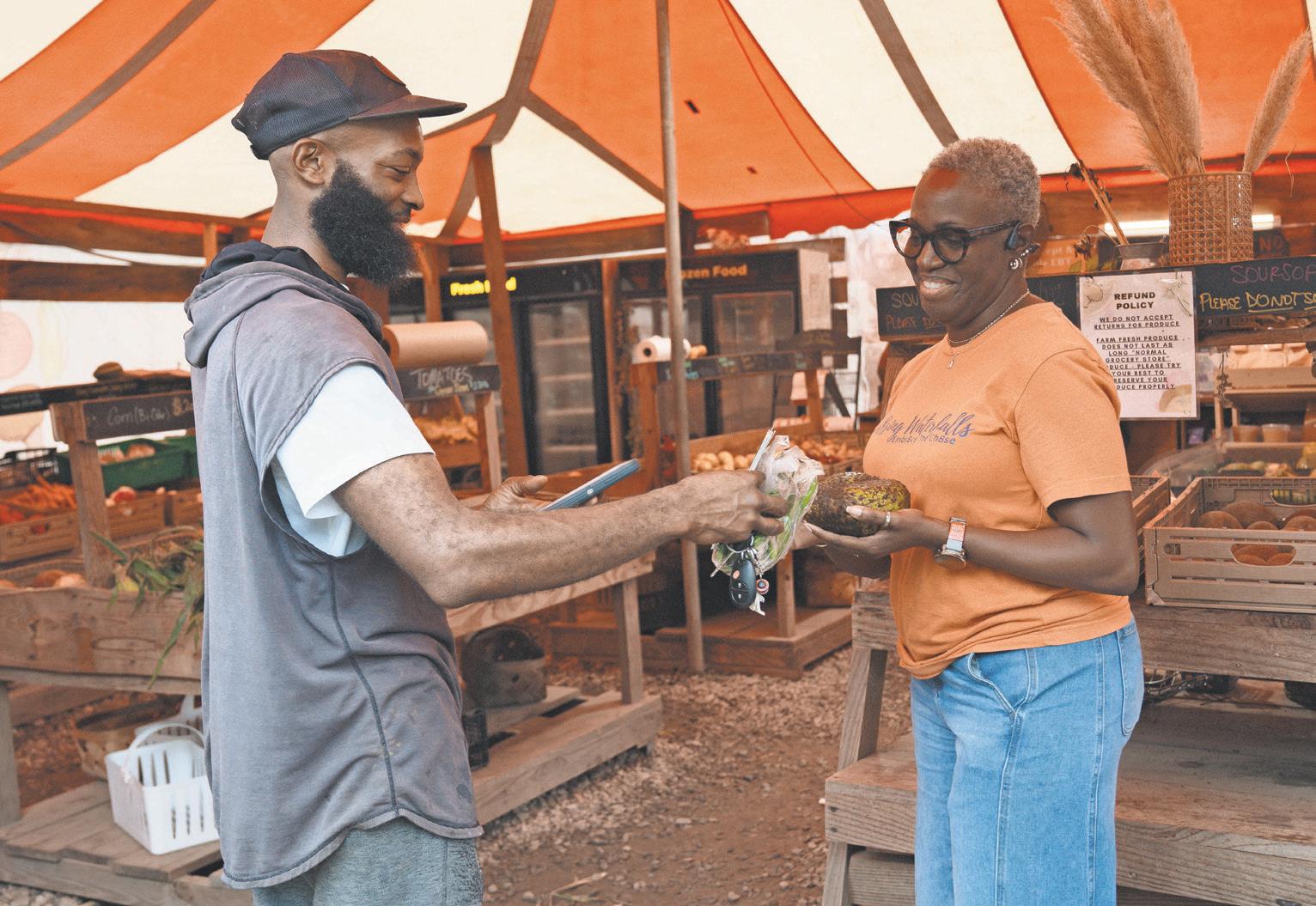





By TABIUS McCOy, Report for America Corp
The farmer’s buoyant tone was like a proud parent cheering their baby on as they took their first steps.
“You want one?” EliYahu Ben Asa asked the reporter, holding out a plump, bronze-colored muscadine he’d just picked from a vine on his farm.
They stood among rows of fruits and vegetation lining this family-owned farmland in Ellenwood. Asa’s duck-brown dickie overalls, damp with dew, stood out. With elation in his eyes, he scanned the vines, picking out recently bloomed muscadines, eating a few more before offering me some again.
The reporter, hesitant to eat crops straight from the ground because of “chemicals,” was reassured by Asa.
“Don’t worry, these are safe to eat,” he said.
Biting into one of the muscadines, the sweetness quickly greeted his taste buds. The freshness was immediately apparent.
Although all the crops grown at Atlanta Harvest are washed and cleaned before selling, eating them straight from the ground or vine without worry of sickness is something only a select few farmers can boast about. According to USDA data, less than 2% of the nation’s farms are sustainable and non-conventional.
For Asa, 30, owner of Atlanta Harvest Farm
and Market, sustainable eating and agriculture have been a way of life for more than two decades.
“All organic, we’ve never been conventional. We never will be,” Asa said about his family-owned farm.
According to the United States Department of Agriculture, conventional farming is the use of seeds that have been genetically altered using a variety of traditional breeding methods
At a time when many consumers believe organic produce is too expensive, Asa’s farm shows that buying sustainable isn’t just about health or freshness — it’s also about educating and strengthening the community.
A kid from the city farming…
Typically, many children raised within the agricultural world come from rural areas surrounded by large parcels of harvestable land. But for Asa, it was a different story. Growing up in New York City, his only farming knowledge came from a small horticulture farm in his childhood Bronx basement and caring for his grandmother’s yard plants.
It wasn’t until Asa was 13 years old that his father purchased 50 acres of land more than 800 miles away in Dublin, Georgia. Asa was told he would help cultivate the family’s newly purchased land.
For some kids, moving from the bustling

city life to rural farm life might be a challenge they’d resent. But Asa had a different outlook.
“I was very happy to do it,” Asa said. “My dad and I have a very tight relationship, so whatever my dad is doing is what I was going to do.”
Throughout high school, Asa attended school in New York City but spent every break in Georgia helping his father on the farm.
Asa mentioned that reviving the raw land was a process he and his dad built from the
ground up. From building shelter to creating a water system, they learned bit by bit.
“As a kid, it felt like camping — living off the land, getting used to the surroundings, exploring, working to build shelter, and making the place our own.”
This experience, Asa said, made him more aware than many of his peers back in New York.
By DONNELL SUGGS
The corner of Clifton Rd. and CDC Pkwy. is usually busy with passing traffic, but earlier this week, there were more people present than cars whizzing by. Supporters of the work being done at the Centers for Disease Control, which is located in Atlanta, were positioned on the opposite corner of the massive headquarters and holding signs that read “Save the CDC”, “CDC Saves Lives. Save the CDC,” and “Keep Us Safe.”
Some of those people holding signs were former or current CDC employees.
The supporters were facing the headquarters and a makeshift memorial for slain DeKalb County police officer David Rose, who was killed during an attempt to enter the CDC and do more damage. The gunman, Patrick Joseph White, was killed
by law enforcement not long after he shot and killed Rose.
Many CDC workers, including a woman who walked over to sign Rose’s memorial card and pay her respect, are working from home today. The scene outside the building is quiet, unlike what took place on August 9, when White attempted to get into the building. White was open to the radar of local law enforcement, but somehow was able to bring a firearm to the CDC and commit murder.
Cobb County police had been dispatched to his family’s home a couple of times this year, but no arrests were made. His family was concerned about his mental health. White’s family told law enforcement that he was angry at the CDC for what he believed was poor control of the COVID-19 disease and the subsequent pandemic.



By CHARLES E. BECKNELL, JR.
Idid not know Malcolm-Jamal Warner personally, but like many who followed his artistry, I felt a connection — and felt seen. When I heard of his drowning, like so many others, I was shocked. Not Theo Huxtable — that beloved character who introduced us to Warner: a teenager whose charm, missteps, and achievements created space for young Black male identity on screen? But through his art, I also saw someone who embodied a different kind of masculinity — vulnerable, curious, kind, understated, intelligent.
His death, as sudden and tragic as it was, reminded me of something sacred: life is but a vapor. We do not choose when it ends. We do not decide when the waters call us home. Like many, in the days following his death, I turned to the data about Blacks and swimming. While some 40 million U.S. adults can’t swim, more than a third of Black adults say they don’t know how to swim, compared to 15% of all adults. The figures vary, but the pattern is painfully clear. Still, what struck me most was this: our people were not always estranged from water.
Our ancestors did not arrive on these shores disconnected from the sea. They came with deep, spiritual ties to it. In West African cosmologies, rivers and oceans are sacred spaces—vessels of power, memory, and divine presence. This profound connection to water is deeply rooted in the lived experience of enslaved African Americans, where water becomes a profoundly spiritual and poetic metaphor.
The meaning of water and drowning in our Black spirituals is a rich and layered legacy, with symbolism that encompasses suffering and salvation, death and deliverance, captivity and freedom. We hear that legacy in the spirituals we still sing — “Take Me to the Water,” “Deep River” — where water becomes a place of liberation and holy encounter.
In the classic spiritual “Wade in the Water,” water invokes biblical miracles and a protective force. The lyrics, “God’s gonna trouble the water,” reflect the belief in divine intervention — water concealed the movement of escapees or put them toward safety on the Underground Railroad. It embodies the promise of healing in the face of adversity.
In the Black Church, we are immersed in water before we rise into new life. Even in the womb, we are cradled in water — safe, forming, held. Water — and the threat drowning — remain a potent spiritual symbol linking our past and present, evoking both the wounds and the healing power at the heart of the Black church’s faith experience. Slavery, settler colonialism, and segregation severed our relationship with water. Black communities were denied access to pools, beaches, and swimming lessons. We lost not just opportunity, but inheritance. What we now call fear was never innate; it was constructed through exclusion. But fear does not have the final word. Our

resilience and strength as a community has and will prevail, a testament to our enduring spirit.
Malcolm-Jamal Warner could swim, according to all accounts. He was swimming at a beach on the Caribbean side of Costa Rica when he was apparently swept away by a rip current. His death had been accidental, caused by asphyxiation by submersion.
I find a profound sense of ancestral peace in believing that his final moments were not only tragic but also sacred — representing transcendence. The waters did not consume him; instead, they received him. He did not fall; he surrendered. He did not go under; he crossed over. He moved from his old life into something new, serving as a testament to the transformative power of water embracing change and growth.
Perhaps he stepped into the waters of Costa Rica and was met there by the Deity of our ancestors — the same Spirit who walked with our foremothers on slave ships; who whispered to fugitives on the Underground Railroad; and who baptized us in muddy rivers when no church would receive us.
Malcolm-Jamal Warner’s legacy will have different meanings for different people. To me, he represented both salt and light to Black America — preserving what is sacred and illuminating the possibilities. He served as a mirror, a muse, and a model of grace and peaceful brilliance. Malcolm embodied truth, dedicating his life to its pursuit.
He asked profound questions, sought wisdom, and engaged deeply with brilliant minds while remaining rooted in his community. He constantly evolved, much like the waters that called him — never static, always flowing.
His sacred becoming is what I carry now. Even in death, he remains with me —not just in memory, but in witness: shaping how I continue to wrestle with manhood, artistry, identity, and gentleness. To me, his living and drowning metaphorically stand for overcoming trials and forging a resilient sense of survival and spiritual rebirth daily.
Let us honor that legacy not merely in words, but in action — by loving deeply, reclaiming our relationship to water — physically and spiritually, teaching our children to swim, and healing what slavery, settler colonialism, and segregation tried to drown. Let us be the architects of our own destiny, reclaiming what is rightfully ours.
Let us remember: Water is not only where we get lost, but also where we are born. It is where we begin again, when the waters call us home to the place where our ancestors are waiting.
May the memory of Malcolm-Jamal Warner be a lasting blessing, inspiring us all and ensuring that his spirit remains an example to follow.
Charles E. Becknell, Jr., is an assistant professor of Africana Studies at New Mexico State University and the pastor of Emmanuel Missionary Baptist Church in Rio Rancho, NM.
FOUNDED
May 11, 1966
FOUNDER/EDITOR
Ed Clayton
Immortalis Memoria
PUBLISHER/EDITOR
J. Lowell Ware
Immortalis Memoria
The Atlanta Voice honors the life of J. Lowell Ware.
PUBLISHER
Janis Ware
PRESIDENT/
GENERAL MANAGER
James A. Washington 2018-2024
EXECUTIVE ASSISTANT TO PUBLISHER
Chia Suggs csuggs@theatlantavoice.com
EDITOR IN CHIEF Donnell Suggs editor@theatlantavoice.com
GENERAL ASSIGNMENT REPORTERS
Isaiah Singleton isingleton@theatlantavoice.com
Laura Nwogu lnwogu@theatlantavoice.com
BUSINESS REPORTER Tabius McCoy tmccoy@theatlantavoice.com
EDITOR AT LARGE
Stan Washington swashington@theatlantavoice.com
ADVERTISING, SALES & CIRCULATION
ADVERTISING ADMINISTRATOR
Chia Suggs advertising@theatlantavoice.com
SALES
RDW Jackson rdwadman@gmail.com
CIRCULATION MANAGER Terry Milliner
SUBMISSIONS editor@theatlantavoice.com
DIRECTOR OF PUBLIC RELATIONS
Martel Sharpe msharpe@theatlantavoice.com
CONTACT INFORMATION
633 Pryor Street, S.W. Atlanta, GA 30312
Office: 404-524-6426 info@theatlantavoice.com



BY JAMES A. WASHINGTON
By JAMES WASHINGTON
From time to time, you read here in this space, my quest, goal, or challenge to define the work that accompanies the faith of a saved Christian. I believe that faith is a verb of a saved Christian. Faith is a verb, and action is the next logical step of a professed follower of Jesus Christ. My dilemma sometimes has been to determine just what it is that I’ve been called to do. What church should I join? What ministry should I participate in? What pastor should I follow? Invariably, when I have prayed on this for guidance, the Lord has a way of reminding me that these are my issues and not His. What church I attend, what pastor I listen to, and what so-called ministry I participate in do not matter to the Almighty. What does matter, He constantly reminds me, is service to my fellow man in His name. Instead of focusing on what to do and which way to go, I should ask God for the opportunity to serve, witness, and expand the knowledge of Him through me.
Continued from page 2
In 2017, after noticing a lack of sustainable fresh produce in Ellenwood, Asa and his family purchased Atlanta Harvest Farmers Market. Atlanta Harvest supplies Atlanta with fresh, locally grown produce.
Much of the produce sold at Atlanta Harvest is grown on the farm or by nearby farms throughout Georgia and the Southeast using sustainable, organic practices.
Despite Atlanta Harvest and a few other organic farms nationwide that avoid pesticides, many consumers believe organic produce is simply too expensive.
Asa admits some organically grown produce might carry a higher price tag than conventionally grown counterparts.
One reason for this price difference can be attributed to economies of scale.
Economies of scale can be defined as the cost advantage companies gain as they increase production or sales volume. Prices tend to decrease with increased production because fixed costs — such as salaries and equipment — are allocated over a greater quantity of goods.
When smaller organic farms like Atlanta Harvest charge more for some produce, “we aren’t trying to price gouge,” Asa said. The price increase helps cover the lack of demand so they can still pay employees and afford necessary upkeep and maintenance.
Although chains like Aldi and Walmart
Every time I get lost in my walk, I, by now, have enough sense to stop and ask directions from the Creator.
I am now convinced that whenever I struggle in the real world, trying to determine if I’m doing this thing right, I am falling prey to, allowing, if you will, the devil to do his thing. His thing is confusion. The more confused I am, the less I’ll do in God’s name, afraid to do the wrong thing. You see, Satan wins if nothing gets done. Each and every time I allow myself to take over, I lose. The prayer to God must first submit all things to His will and respond accordingly to what comes next. What comes next is the work. What comes next is what God would have you do. The answer is understanding that the job of being a Christian is to let go and let God. The hard part is letting go. The easy part, once

might offer lower prices, it’s hard to compete with their distributors who mass produce and distribute products, Asa said. “I actually make the compost and test the soil by hand, so it takes work.”
To help make fresh produce more affordable, Georgia’s Fresh for Less program provides a 50% discount on fruits and vegetables for SNAP recipients at select markets and grocery stores, and Atlanta Harvest is one of the participating markets. Programs like this help make sustainable eating a bit more accessible.
Based on numerous scientific studies, it’s difficult to say that organic produce is definitively healthier. Some research suggests its possible
you’ve done that, is then and only then to recognize that God will give you something to do. Not only will He give you something to do, He will also give you the means to accomplish it. Every time I get lost in my walk, I, by now, have enough sense to stop and ask directions from the Creator. I generally get what I’ve asked for each time I do this. Like Christ turning over tables in the temple, the point is doing God’s work, not getting hung up on the definition, parameters, or the name of the work. You know, Jesus spent a lifetime trying to get people to relate to the spirit of the law, rather than the rule of the law. Bingo! That’s it. The spirit of God’s law demands that we remain open to the possibility
that we can, will be, and must be used in His service. We must give Him all the honor and all the glory. Faith prepares you for this. Faith molds you for this. Faith gives purpose and intent. Through this faith, God provides circumstances and opportunity. The rest is up to us. Just remember there is a way out when you get confused, lost, or overwhelmed. Treat the next person you meet, and deal with the next circumstance you encounter as sent by God to allow you to put your faith in His hands. Christ has already guaranteed the outcome. Let go and let God. The rest is given. May God bless and keep you always.
This column is from James Washington’s Spiritually Speaking: Reflections for and from a New Christian. You can purchase this enlightening book on Amazon and start your journey toward spiritual enlightenment.


benefits, such as decreased cancer risk, while others find no noticeable health differences.
However, certain crops, such as blueberries, have a short shelf life. Buying them locally grown and freshly picked can offer a longer shelf life compared to grocery store blueberries shipped across the country over several days, explained Dr. Laurel Dunn, a Food Science and Technology professor at the University of Georgia.
Beyond freshness and potential health benefits, buying organic and sustainable supports the local economy.
“Your dollars go right back into your
community. I think that is the biggest benefit — you’re paying and supporting your neighbor, which impacts the community,” Dunn said.
Atlanta Harvest hires people living in metro Atlanta and even gives volunteers the opportunity to learn farm management.
Local sustainable farms like Atlanta Harvest serve as communal hubs for food knowledge, a characteristic many billion-dollar conventional farms can’t claim.
“We’re just trying to grow food for the community and educate them on eating and making nutrient-dense foods more accessible,” Asa said.
By ISAIAH SINGLETON
Mayor Andre Dickens, Coun-
cilmember Jason Dozier, and the Atlanta Department of Transportation (ATLDOT) hosted the ribbon cutting of a key corridor that links major business and entertainment hubs in downtown Atlanta.
The Ted Turner Bridge, formerly the Spring Street Bridge, has been shut down for the last seven years, forcing drivers to detour blocks out of the way to get around one block.
Now, the bridge includes a rebuilt viaduct and roadway, extending from the intersections of Mitchell Street SW, situated between the Richard B. Russell Federal Building and the Martin Luther King, Jr. Building, and Martin Luther King, Jr. Drive SW.
Improvements to the corridor include the widening of the newly constructed Martin Luther King, Jr. Drive viaduct and the new abutment to the Ted Turner SW viaduct, along with the expansion of the approach slab, construction of a retaining wall, and reconstruction of the lower part of Martin Luther King, Jr. Drive SW.
This project was delivered in partnership with ATLDOT, the Georgia Department of Transportation (GDOT), and the Federal Highway Administration (FHWA).
Dickens said the reason everyone is excited about the reopening of the Ted Turner bridge is because “we are all connected in one way or another.”
“There are so many businesses, commuters, and residents in this area, we’re all connected,” he said. “We are officially reopening one of the most traveled and historic gateways into downtown Atlanta.”
Dickens says this roadway is now “safer, stronger, and better” connected for everyone moving through downtown Atlanta stations. He also says this project has been in the works for a “long time.”
“This would ease traffic congestion and support long term mobility,” he said. “This was a bold step in the right direction, and our own going efforts to enhance our downtown area and provide upgrades of Atlanta’s infrastructure.”
Solomon Caviness, Commissioner, Atlanta Department of Transportation (ATLDOT), said Ted Turner bridge isn’t just steel and concrete, but it’s the “beating heart” that connects South downtown into the entertainment district.
“There’s so much that went into this project to include widening of crosswalks, including bike lanes and connectivity,” he said. “We wanted to make sure we took advantage of supporting those less fortunate and that needed us the most, those disabled folks who need crossings, that need

sidewalks, that need access. This is for them.”
Canines also says leadership matters as he thanked Dickens and the aid of GDOT.
“This is what love looks like in the city of Atlanta. This is a group project and it’s more than a piece of infrastructure. It’s a statement and a declaration that Atlanta is growing with purpose and shaping a city where mobility meeting possibility,” he said.
Additionally, Dozier said he was also proud to be a part of this project.
“At the end of the day, for me, it is about ensuring we are continuing the work we started not with this term and administration, but since we put together action plans and more, we can ensure Atlanta continues its path forward of being likeable, most accessible, and most connected city in this country,” he said.
By NOAH WASHINGTON
Ajahnae Padgett has been searching for work for two years. The 33-year-old single mother from Atlanta earned an EKG certification in 2023 through a Clayton County program, but despite her credentials, employment has remained elusive.
“I’m a single parent. I’ve had some setbacks, and I think this is a great community event that will help people like me who are hungry for the next level, but just need opportunity,” Padgett said Saturday as she toured the newly opened the Workforce Career Center (WCC) in West Midtown on a cloudy Saturday afternoon.
Padgett’s story illustrates exactly why Atlanta’s newest workforce career center exists. The Workforce Career Center at 1073 Huff Rd. N.W. opened its doors with a promise that resonates deeply in today’s economic climate: providing real skills for real jobs, without the burden of traditional college debt, and more importantly, ensuring students have the support systems needed to transition successfully into employment.

‘Education needs to evolve’
What sets the Atlanta Workforce Career Center apart from the program where Padgett earned her unused certification is its network of industry partnerships that create direct pathways from classroom to career.
Shanetha Culbertson, workforce development manager for Grady Health System, emphasized the importance of these connections. With 18 months in her current role and 20 years in workforce development, Culbertson sees the partnership as crucial for building a health care pipeline. “WCC has health care programming, and they would like to partner with us to create a pathway for their students who complete training to have a pathway into Grady Hospital,” she explained.
Booker said. “When we think about getting and obtaining jobs, one of the fastest ways right now is to obtain certifications.”
The Microsoft partnership, which began development eight to 10 months ago, builds on successful workforce programs the team previously implemented in Texas. For Booker, the Atlanta expansion represents a natural evolution: “Education needs to evolve, and it needs to change, and it needs to meet with the times. It needs to focus on the actual jobs of the future, not the jobs of the past.”
‘God said build it, and they will come’ Marion Skinner, the visionary behind the Atlanta campus, stood among the crowd of supporters and prospective students like Padgett with evident pride. “God said build it, and they will come,” Skinner reflected, watching as community members toured the newly opened facility. “I appreciate the support of the community behind me. I’m just here to train and upskill all these individuals.”
For someone like Padgett, who earned her EKG certification through a much smaller Clayton County program with only six to eight students and no employer partnerships, this direct connection to Grady represents exactly what was missing from her previous training experience.
The training center is a comprehensive approach to workforce development that addresses Atlanta’s critical skills gap while providing accessible career pathways for underserved communities. For people like Padgett, who already have certifications but lack the connections and support to find work, the center offers something different: direct partnerships with employers.
Microsoft’s involvement brings a technology component to the training programs. Darrell Booker, Microsoft’s tech community acceleration lead, highlighted their “train the trainer” model. “We work with Marion and the workforce team by training some of their trainers to ensure that they can deliver not only digital literacy training, but also some of the more skilled things, such as AI,”
‘I’m here exploring my options’ Padgett is considering both transportation and health care certification options, determined not to let her previous setbacks define her future. Her EKG certification expires soon, but rather than seeing this as another obstacle, she views the Workforce Career Center as a chance to start fresh with better support.
In May 2025, The U.S Bureau of Labor statistics posted that Georgia has approximately 333,000 job openings with a job-openings rate of 6.3%, significantly higher than the national average of 4.6%. While that may seem like a positive indicator, it actually reflects a growing gap between available jobs and a workforce equipped with the skills to fill them, a gap the Workforce Career Center was built to address.
By TABIUS McCOy Report for America Corp
Atlanta-based 1st Choice Credit Union, which serves employees of Grady Health System, announced in July that it will be merging with Mississippi-based HOPE Credit Union and its affiliates, Hope Enterprise Corp. and Hope Policy Institute.
1st Choice currently manages over $32 million in assets and serves nearly 8,600 members. It operates locations at Grady Memorial Hospital and in the Sweet Auburn neighborhood and is affiliated with the Morehouse School of Medicine, Emory School of Medicine, Southside Medical Center, Atlanta Life Insurance Company, and the South Fulton Community Development Corporation.
1st Choice has been serving the Atlanta community since 1946, originally named Hospital Authority until 1991. According to Billy Wright, the chief financial officer
of Grady Health System, its primary purpose was to serve Grady Hospital employees.
“We look forward to partnering with Hope Credit Union to continue and expand this 79year legacy,” said Billy Wright, Chief Financial Officer at Grady Health System.
Hope Credit Union is a Black woman–owned financial institution founded in Jackson, MS, in 1994. Over 30 years later, the institution has served under-resourced communities in Alabama, Arkansas, Georgia, Louisiana, Mississippi, and Tennessee.
Hope Credit Union CEO Bill Bynum told The Atlanta Voice that this upcoming merger will open up new opportunities for 1st Choice members.
“I think Hope provides additional products and services that 1st Choice was not able to offer previously. We have a really strong mortgage department, and 90% of our mortgages are to first-time homebuyers,” Bynum said.

Bynum stated that this merger will help Hope fill a financial gap within many underserved communities of color.

“And so we have also seen that traditional banks are not in those communities in as strong a way as they should be. That leaves a gap, and Hope Credit Union exists to fill those gaps.”
Additionally, as the merger rolls out this fall, people can expect to see some new roles at the credit union.



“Staffing needs will be in the market, but we will be hiring in Atlanta,” said Bynum. “Every community has its unique characteristics, and so we will be bringing on colleagues who know Atlanta much better than I do.”
The merger is expected to be completed this fall.




































By DONNELL SUGGS
Georgia State Senator Jason Esteves walked into the WAREhouse Studios on the campus of The Atlanta Voice for the first time on the morning of Tuesday, August 5. A native of Columbus, Georgia’s southside, Esteves immediately noticed the vintage newspaper front pages on the walls en route to the studio space in the back of the building. “There’s a lot of history here,” he said.
As small business owners, Esteves and his wife, Ariel, a nurse practitioner, understand the power and place a small business has within a community. The Esteves’ are planning to cut the ribbon on their second Flying Biscuit Cafe franchise in Macon on Wednesday. The couple also owns an urgent care clinic. Small business ownership, affordability, cost of living, and hearing from voters are some of the topics Esteves discussed with The Atlanta Voice during the interview.
Esteves and his campaign team recently returned to Atlanta from campaign stops and listening sessions in Bryan, Chatham, and Liberty counties over the past weekend.
The Atlanta Voice: Good morning, State Senator Esteves. Let’s get right to it. Why did you decide to run for governor?
Jason Esteves: I’ve decided to run because Georgians deserve better than what they have got. We’re a state that has made progress, but far too many people have been left behind, especially when you look at Black communities across the state. You have people across the board who are having a hard time paying rent, paying their mortgage, downsizing their
home, or buying their first home. They deserve a governor who is going to prioritize the people of this state and put them over politics.
AV: What should Georgia voters know about you that they don’t already know or can’t find out with a simple Google search?
JE: They should know that I was raised on the south side of Columbus, and against all odds, I started several small businesses with my wife, who is my better half. She is a superstar. We have been able to build businesses across this state in areas that need them the most.
That not only reflects the values that I have been working with in my personal life, but those are also the values I have been leading with in my professional and political career. Making sure that areas in Georgia that need the most help are getting that attention, support, and love from our state leaders.
AV: What do you believe you can bring to the office of the governor that the other candidates cannot as an experienced small business owner?
JE: For me, there are several reasons. When you talk to the average voter, at the top of their mind is their ability to afford life in Georgia, and how they feel like that is slipping away. For me, affordability is fundamental to having a state that thrives, especially for folks who may not live in a place like Atlanta or have access to resources and capital. What we have seen for too many Georgians they feel like they are worse off than their parents and their grandparents. And we can change that.
Esteves mentioned Georgia’s fiscal ability,

Georgia State Senator Jason Esteves (above) dropped by The Atlanta Voice on Tuesday, August 5, 2025. He spoke with us about whye he’s running for governor, family, being a small business owner, and the affordability gap in Georgia. Photo by Tabius McCoy/The Atlanta Voice
with its billions in unallocated surplus cash, and how that could be used to strengthen the small business community.
You have a state that has $16 billion sitting in a bank account, building interest, and another $2 billion sitting in the Georgia Lottery, building interest above and beyond what is needed. We can invest that money into building our communities so that kid in Bankhead, just like that kid in Midway, can have opportunities to thrive regardless of who they are or where they live.
As a Black man, I often get asked how I got
to where I am. I wish that I could say it was solely because of hard work. But when I look to friends that I grew up with, I can only conclude that a big piece of it was luck. We need a governor who is going to build a state where your success in life is based on merit and not luck.
AV: Your statewide tour kicked off this past weekend. You were in Chatham and Liberty counties. How did that go?
JE: It was great. It’s clear that Georgians are excited about a new generation of leadership. They are excited about the fact that I bring so many different experiences as a state senator, as a public school teacher, as a school board member, as a small business owner, as a parent, and as a husband. They appreciate the fact that I came out there to talk to them about the issues that they care about.
AV: Why is affordability so important to you?
JE: If we show our small businesses the same kind of support that the current governor gives to large out-of-state corporations, imagine the power that we would unlock in our communities and how many communities would be revitalized and start to thrive because of it. My first-hand experiences are absolutely a strength and something I would take with me into the Governor’s office as we shape Georgia into a state that truly values its people.
It is our people who will truly make Georgia the number one place to do business, live, and raise a family. That’s what my career has been about—people.
By ISAIAH SINGLETON
Erik Coleman, an environmental health professional and community advocate, announced his candidacy for the East Point City Council, Ward D At-Large, in the upcoming election on Tuesday, November 4.
A resident of East Point since 2018, Coleman is running to bring new energy, transparency, and results-oriented leadership to City Hall.
Coleman says his platform is about delivering real progress and not more failed promises. He also says being East Point Proud means building a city where everyone can thrive in a safe, empowered, and united environment. Additionally, he said he wants to transform East Point’s Downtown Commons into a “vibrant, mixed-use destination.” He told The Atlanta Voice that it is just one example of how the city can turn potential into progress and bring lasting value to the community.
With over 20 years of public service, Coleman currently serves as a Health Scientist (Informatics) at the Centers for Disease Control and Prevention (CDC), where he focuses on preventing environmental health hazards and enhancing community health outcomes. He brings extensive expertise in public

Communities: In partnership with City Council, Coleman will champion access to quality healthcare, strong public schools, and community programs that support residents of all ages—because healthy, informed, and engaged neighbors strengthen the city.
Safe and Livable Neighborhoods: In partnership with City Council, Coleman will invest in public safety, increase housing options, and support walkable streets, clean public spaces, and vibrant parks—so families can thrive, and seniors can age with dignity.
Coleman sat down with The Atlanta Voice to discuss why he chose to run for city council.
The Atlanta Voice: What makes you the best candidate for the East Point City Council for Ward D At-large?
an East Point that is more empowered, safe, and united.
AV: Why choose to run for city council now?
EC: If not now, when? If not me, who? I think it’s always the right time to do the right thing. Martin Luther King said that before, and I think it’s my time. I have always been interested in community advocacy and ensuring my community thrives in important ways to elevate society. It just seems like the right time for me now. I have several years of experience and knowledge that have prepared me for this moment, and I am equipped for this opportunity and all the challenges that await me.
health, community revitalization, and grassroots engagement.
Coleman’s top priorities include:
Economic Empowerment for All : In partnership with the City Council, Coleman will work to grow East Point’s local economy by attracting businesses, creating good-paying jobs, and supporting entrepreneurs so that opportunity is within reach for every resident.
Healthy, Educated, and Connected
Erik Coleman: I’m the best candidate because I am a long-time public servant. I have dedicated my life to community service. I am a public health professional, community advocate, and a proud East Point resident. I’m proud of what we’ve done in East Point, and even more excited about where we’re headed. I bring data-driven decisions and solutions to issues we have in East Point and lived, personal, and professional experiences. I am deeply committed to building
AV: What does the city of East Point mean to you?
EC: East Point is home. When I think about East Point, I think of the wonderful opportunity that has provided me to become a firsttime home buyer and owner. I think about the ability it has given me to begin creating generational wealth, which is so important, especially for our communities. East Point has just given me the tools to move up in the world.
By DENNIS MALCOM ByRON AKA ALE SHARPTON
Admittedly, I was excited to review the 2025 Lucid Air Sedan. It was my introduction to this automaker’s line of all-electric vehicles, and the Air was turning my head every time I laid eyes on it. The sedan’s low profile, wide body, and overall stealthy look made it a standout from other cars in their segment, so the only thing left to do was actually drive one. Well, my anticipation was justified thanks to the Air’s cutting-edge technology, muscle-flexing powertrain, and jaw-dropping driving range, rounded out with refined opulence.
Coming in four trims—Pure, Touring, Grand Touring, and Sapphire— Air’s second tier Touring version justified its “luxury” designation.
Dressed in a dark Fathom Blue Metallic, the exterior’s aerodynamic design was complemented with flush door handles which come illuminated, intelligent micro lens array LED headlights, and a few optional enhancements: the 20-inch “Aero
Lite Stealth” wheels” and what my dad loved, the signature glass canopy roof that extended to the second half of the cabin. While that latter feature was captivating, I did worry about the pain of replacing this elongated windshield and how it would own up to an unforgiving sun, but the optimal visibility and overall feel of driving in something reminiscent of an all-glass aquarium tunnel won me over. It’s also acoustic-laminated to ensure cabin serenity, so that was another win.
The heart of the Lucid Air touring gets a sophisticated dual-motor combination with an all-wheel-drive powertrain, resulting in 620 horsepower and a bolting zero-to-60 time of 3.4 seconds; remarkably, the 377-mile driving range equates to an impressive combined 121 miles per gallon. Charging is also impressively efficient, with the ability to recover 200 miles in about 15 minutes on a fast charger. As a significant bonus, the carmaker just announced all Lucid Airs will have access to more than 23,500 Tesla

superchargers by July 31 of this year. Inside, the space-age vibe continues. The glass cockpit display—a stunning 34-inch floating screen— integrated with a retractable “Pilot Panel” screen to encourage the perfect physical setting for the driver. The PurLuxe leather alternative felt soft, pampering, and was complimented with premium natural textiles. A 21-speaker Surreal Sound Pro audio system delivered the concert experience, while heated and ventilated front seats; a heated steering
wheel; and quad-zone climate control ensured maximum comfort for every occupant. That equates to each passenger having a custom temperature-controlled ride thanks to the addition of the Comfort and Convenience package ($2,500), which also includes soft-close doors, a heated steering wheel, massage front seats, heated rear seats, and power rear-window shades. To further ease the mind, I recommend the DreamDrive Pro option ($2,500) providing a plethora of driver-assistance applications ideally
for long trips. The Air’s connectivity pulls no punches as well, including wireless Apple CarPlay, wireless device charging, Bluetooth, four USB ports, and a Wi-Fi hot spot.
The base price is $78,900, and with all optional packages included, this review model totals about $102K. But hey, it costs to be luxurious and the Lucid Air is exactly that, with the bonus of being eco-friendly, providing a rocket-like driving experience and overall, a glass canopy view of Lucid’s promising future. I can’t wait to experience the Air’s other three trims and Gravity SUV which collectively will have other competitors trying to keep up. Then again, Lucid’s class-leading driving range will make that even more difficult.
Fuel Economy (MPGe): 124 city/119 highway/121 combined with a possible 377-mile driving range
Price: The 2025 Lucid Air Touring starts at $78,900, and $102,600 as reviewed.
For more information, visit Luicidmotors.com.



By NOAH WASHINGTON
Anew size-inclusive fashion platform launched its first brick-and-mortar location in late July, bringing together independent brands that cater to customers often overlooked by traditional retailers.
Viva Voce, founded by Kate Zigrang, opened its Atlanta pop-up at 312 North Highland Ave. NE
The retail space, which will be open through mid-September, will feature clothing in sizes XXS to 6X and 00 to 36 from brands including Tamara Malas, Nomads, ABLE Clothing, and TomboyX.
“Our hope is that people really can come in, feel welcome, feel seen, and find something that not only fits them well, but expresses their personality and makes them feel good when they wear it,” Zigrang said during the opening event.
Zigrang, who lives in Hawaii but is originally from New Jersey, said she chose Atlanta for the company’s first physical location because of the city’s diverse community and welcoming atmosphere.
The venture began in April 2024 when Zigrang started developing what she describes as a marketplace for ethical, sustainable and inclusive fashion brands. As

a tall, plus-size woman, she said she struggled to find clothing that fit well and reflected her personal style.
“I realized there was really a blank space that needed filling, and these clothes needed to be more accessible to people, and people needed to know that they were out there,” she said.
The company name, “viva voce,” translates to “with living voice” and references the type of voice vote used in legislative bodies. Zigrang said it represents the collective voice
calling for change in the fashion industry.
Among the featured brands is Tamara Malas, launched in 2018 by designer Tamara Malas, who previously worked for luxury fashion brands that typically offered sizes only up to XL. After realizing she couldn’t wear the clothes she helped design, Malas shifted focus to serve her own community.
“I didn’t think I realized that I was sort of involving myself in a form of activism by just making clothes that fit a certain body type,” said Malas, who operates a
By KENNEDy SAMUEL
DTU Intern
For Tahir Murray, founder and CEO of clothing brand Legacy History Pride, success isn’t just defined by dollar signs, it’s about the impact. The Howard University Alum and entrepreneur is leading a cultural movement through fashion, building a brand that celebrates the legacy of Historically Black Colleges and Universities (HBCUs) while reimagining what it means to wear its pride on your chest.
Growing up watching his grandfather, who came from Trindad and Tobago in search of the American Dream, Murray says. “He was a shoe cobbler and opened a shoe repair store that later became a sneaker shop. My dad worked in it too. That store was more than a place to buy shoes, it was a hub for community, for connection, for culture.”
It was in that small family-owned space that Murray first saw the power of style as a vehicle for storytelling and transformation. That lesson would carry with him through college and beyond,
inspiring the birth of Legacy History Pride, a brand rooted in heritage and driven by purpose.
When Murray stepped onto the campus of Howard University, as a freshman, he immediately noticed a difference in the apparel offered at the institution’s bookstore. Murray recalls, “Going to the bookstore my freshman year, I definitely saw just a lack of representation when it comes to just the design and quality of goods we had in the bookstore compared to other schools and compared to PWI’s”
Instead of complaining, Murray got to work. He set out to design products that matched the vibrancy, excellence, and cultural power of HBCUs, creating gear that not only looked good but carried deeper meaning.
“LHP is about matching the energy of the HBCU experience,” he explains. “ So my main focus was how can I create products and build a brand that matches the energy that is rooted in the HBCU spirit and rooted in black culture.”
Attending an HBCU didn’t just
shape Murray’s creative vision, it resonated in his spirit. He describes his time at Howard as a transformational chapter, one that gave him the courage to lead with authenticity and purpose.
“You really learn how to be unapologetically yourself,” he says. “Being around people who are committed to building you up, not just as a student but as a person, gave me the confidence to understand who I am and what I stand for. HBCUs will humble you, but they also prepare you for the world like no other place can.”
While Murray’s brand is known for its bold designs and high-quality apparel, he wants to remind people that LHP is more than just a clothing company. It’s a platform for social impact.
“We’ve partnered with the Atlanta HBCU Alumni Alliance on philanthropic projects, and one of our biggest collaborations was with Black Lives Matter,” he shares. “That initiative allowed us to give a quarter of a million dollars in scholarships to Black and Brown
brick-and-mortar store in New York City’s Lower East Side. Her brand now offers sizes zero to 6X in every style.
Also featured is Nomads Swimwear, founded by Taylor Long in 2020. Long, a University of Cincinnati graduate who started the company as a senior capstone project, said she identified a gap in the market for contemporary plus-size swimwear.
“A lot of brands, traditionally, if they have plus sizes at all, are very matronly, very modest, very conservative,” said Long, who moved from Atlanta to Los Angeles last year. “The industry is always saying, ‘This is what you can wear,’ and we don’t subscribe to that.”
Long’s brand has attracted celebrity customers including Serena Williams, Tabitha Brown and Tamron Hall. She received more than $150,000 in grant funding, including a $25,000 grant from American Express, and was named to Forbes’ 30 Under 30 Atlanta list.
Viva Voce plans to expand with another pop-up in New York this fall. The company also operates an online marketplace and aims to continue pushing boundaries on sustainability and size inclusivity.
“We want everyone to know that they belong, and fashion is our vehicle for doing that,” Zigrang said.

students and HBCUs students.”
Tahir Murray is only walking in the footsteps of his grandfather, but he’s carving a new path. One that honors tradition while pushing the boundaries of style, storytelling,
and social change. Legacy History Pride isn’t just a brand; it’s a movement. And through it, Murray is proving that success isn’t measured by what you make, but by what you leave behind.

By DONNELL SUGGS
The road back to the playoffs began two weeks ago at the start of training camp. The preseason is an opportunity to separate the players who will play both big and small parts in getting the Falcons back in the postseason for the first time in eight seasons from the players who won’t be getting that opportunity, at least not in Atlanta.
During the joint practices with the Titans, the Falcons’ receivers seemed to steal the show during offense vs. defense drills. This year’s crop of receivers might be the deepest the franchise has ever seen—if not ever, then at least since the Falcons made the Super Bowl in 2016.
That team had future Pro Football Hall of Fame inductee Julio Jones (83 catches for 1,409 yards and six TDs), Mohammed Sanu (59 catches for 653 yards and four TDs), tight end Levine Toilolo (13 for 264 and two TDs), and running back Devonta Freeman, who caught 54 balls from another future Pro Football Hall of Famer, quarterback Matt Ryan, for 462 yards and two TDs. Receivers Taylor Gabriel and Justin Hardy were both on the roster and able to step in at times, and so was a third-round pick and rookie tight end by the name of Austin Hooper.
During the first of two joint practices against the Tennessee Titans on Tuesday, the Falcons’ receivers looked more aggressive than they had been in camp. Considering this was only the second time they were playing someone other than their teammates, the Falcons opened the preseason against the
Detroit Lions last week.
Last season’s leading receiver, Drake London (100 catches for 1,271 yards and nine TDs), will be the lead dog this year as well. His on-field chemistry with second-year quarterback Michael Penix, Jr. will be crucial to both London’s and Penix’s progression this season. London is a surefire number one receiver, and despite the Titans’ defensive backs knowing it, that didn’t stop Penix from finding him over and over again during offense vs. defense drills. London caught passes over the middle and down the sidelines. From time to time, London, a former member of the University of Southern California basketball team, could be seen shaking his head following a catch. London will be a target for all 14 Falcons opponents this season.
Darnell Mooney was second in receptions last season (64) and nearly reached the 1,000-yard mark (992 yards) while adding five touchdowns. Mooney, Ray-Ray MCCloud III (62 catches for 686 yards and a touchdown), and KhaDarel Hodge (seven catches for 131 yards and a touchdown in 17 games in 2024) will round out the receivers on the roster.
Running backs Bijan Robinson (61 catches for 431 yards and a touchdown) and Tyler Allgeier (13 catches) will be outlets for Penix, Jr. when he’s under pressure. Robinson was another frequent target for Penix’s passes during both joint practices. Former Falcons starting quarterback Kirk Cousins found Allgeier for screen passes during his time on the field.
Robinson was third in receptions for running backs last season behind only Miami Dolphins back De’Von Achane (78 catches)

and New Orleans Saints running back Alvin Kamara (68). Robinson was targeted 72 times last time, fourth most in the league behind Kamara (89), Achane (87), and New York Jets back Breece Hall (76).
Falcons tight end Kyle Pitts (47 catches for 602 yards and four touchdowns) and his backup, Charlie Woerner (seven catches for 46 yards in 16 games last season) weren’t threats in the red zone last season, but can have stronger seasons this year now that the quarterback position is stable. Cousin’s late-season play was poor, which didn’t help the tight ends at all.
The last time the Atlanta Falcons played a regular-season game inside Mercedes-Benz
Stadium was at the end of the 2024 regular season, when they lost a 44-38 thriller to NFC South rival Carolina. That game took place this year, January 5, to be precise, but it feels like years away from the 2025 Falcons and the expectations surrounding the team.
The 2025 regular season will begin with a home opener against NFC South rival Tampa Bay on Sunday, September 7. To properly prepare for that game, the Falcons have been in training camp, played a preseason game, and hosted a joint practice with the Tennessee Titans on Tuesday and Wednesday.
Falcons pass catchers will play a big part in how the season begins and ends.

Spacious 1-Bedroom Affordable! Rent Based on Annual Income Amenities, Great Location, and Convenient to Marta Please call for detailed information (404) 586-9098



Snowflake Inc has mltpl Technical Support Manager positions avail in Atlanta, GA. Dlvrng exclnt tech suport in 24x7x365 SAAS envnrmnt. Be rspnsble for hiring, dvelpmnt, training, & skills mnagmnt for a team of cloud spport engnrs.Tlcmtg prmttd. Successful candidate’s starting sal will be dtrmnd based on permissible, non-discriminatory fctrs such as skills, exp, & geo lctn. This role is also elgbl for a cmptve bnfts pckge that incld: medical, dental, vision, life, & disability insrnce; 401(k) ret plan; FSA & HSA; at least 12 paid holidays; PTO; parental leave; ee asst program; & other co bnfts. $210413 - 218960/yr. To apply, send rsme & trnspts w/ job title & Ref#7627758 to resume@snowflake.com. EOE.

RFP for The Fifty-Five, located at 2855 East Point Street, East Point, GA
BIDS DUE: August 19, 2025, at 2:00pm
PRE-BID MEETING will be held on site on July 24, 2025, at 10:00 am
PLANS: Hard Copies of plans available upon request and at subcontractor’s expense from A1 BluePrint, (404) 524-8881 or a1blue.com OR for a link contact Linda at Lstache@gormanusa.com.
Contact Info: Linda Stache, Gorman & Company, Phone: 608-835-5177, Fax: 608-835-3667
CERTIFICATIONS: SBE / MBE / WBE / EBE / DBE / VBE
Please note: This is a prevailing wage rate project.
FULTON COUNTY ADVERTISEMENT FOR BIDS
Bid Solicitation for 25ITB1450138A-ST Fire Hydrant Maintenance & Repairs for Fulton County Public Works will be accepted online through BidNet Direct on Tuesday, September 02, 2025. All Bids submitted must be received no later than 11:00 a.m. local (Eastern) time on the stated date. https://www.bidnetdirect.com/georgia/fultoncounty
SCOPE OF WORK: Fulton County, Georgia (“County”) Providing Fire Hydrant Maintenance and Repairs Services. The detailed scope of work and technical specifications are outlined in the Scope of Work of this bid document.
In order to obtain complete information about this solicitation, please click the link below where this document and supporting documents can be downloaded, https://www.bidnetdirect.com/georgia/fultoncounty
FEE: N/A
CONTRACT TERM: 1 Year with (2) One-Year Renewal Options.
PRE-BID CONFERENCE: will be held virtually online via a Zoom Conference on Tuesday, August 19, 2025 at 10:00 A.M. to provide bidder(s) with information regarding this project and to address any questions.
Join Zoom Link: https:https://zoom.us/j/98422098448?pwd=r7zDfWvrKvfp6CMxctnvPUpoTX n0w4.1
Meeting ID: 984 2209 8448 Passcode: 893033
One tap mobile +14702509358,,98422098448#,,,,*893033# US (Atlanta) +14703812552,,9 8422098448#,,,,*893033# US (Atlanta)
If you have any questions regarding this project please contact Shondra Turner, APA, (404) 612- 1100 or Email: shondra.turner@ fultoncountyga.gov.
Fulton County reserves the right to accept or reject any and all applications and to waive technicalities.